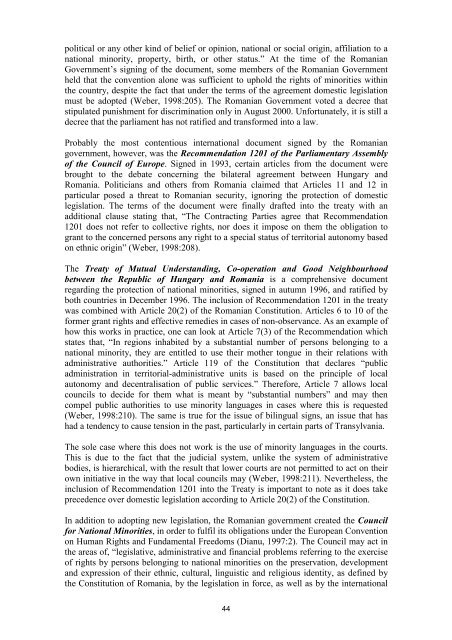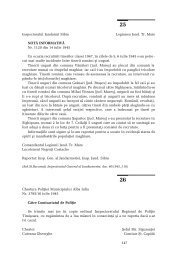Southeast Europe
Southeast Europe
Southeast Europe
You also want an ePaper? Increase the reach of your titles
YUMPU automatically turns print PDFs into web optimized ePapers that Google loves.
political or any other kind of belief or opinion, national or social origin, affiliation to a<br />
national minority, property, birth, or other status.” At the time of the Romanian<br />
Government’s signing of the document, some members of the Romanian Government<br />
held that the convention alone was sufficient to uphold the rights of minorities within<br />
the country, despite the fact that under the terms of the agreement domestic legislation<br />
must be adopted (Weber, 1998:205). The Romanian Government voted a decree that<br />
stipulated punishment for discrimination only in August 2000. Unfortunately, it is still a<br />
decree that the parliament has not ratified and transformed into a law.<br />
Probably the most contentious international document signed by the Romanian<br />
government, however, was the Recommendation 1201 of the Parliamentary Assembly<br />
of the Council of <strong>Europe</strong>. Signed in 1993, certain articles from the document were<br />
brought to the debate concerning the bilateral agreement between Hungary and<br />
Romania. Politicians and others from Romania claimed that Articles 11 and 12 in<br />
particular posed a threat to Romanian security, ignoring the protection of domestic<br />
legislation. The terms of the document were finally drafted into the treaty with an<br />
additional clause stating that, “The Contracting Parties agree that Recommendation<br />
1201 does not refer to collective rights, nor does it impose on them the obligation to<br />
grant to the concerned persons any right to a special status of territorial autonomy based<br />
on ethnic origin” (Weber, 1998:208).<br />
The Treaty of Mutual Understanding, Co-operation and Good Neighbourhood<br />
between the Republic of Hungary and Romania is a comprehensive document<br />
regarding the protection of national minorities, signed in autumn 1996, and ratified by<br />
both countries in December 1996. The inclusion of Recommendation 1201 in the treaty<br />
was combined with Article 20(2) of the Romanian Constitution. Articles 6 to 10 of the<br />
former grant rights and effective remedies in cases of non-observance. As an example of<br />
how this works in practice, one can look at Article 7(3) of the Recommendation which<br />
states that, “In regions inhabited by a substantial number of persons belonging to a<br />
national minority, they are entitled to use their mother tongue in their relations with<br />
administrative authorities.” Article 119 of the Constitution that declares “public<br />
administration in territorial-administrative units is based on the principle of local<br />
autonomy and decentralisation of public services.” Therefore, Article 7 allows local<br />
councils to decide for them what is meant by “substantial numbers” and may then<br />
compel public authorities to use minority languages in cases where this is requested<br />
(Weber, 1998:210). The same is true for the issue of bilingual signs, an issue that has<br />
had a tendency to cause tension in the past, particularly in certain parts of Transylvania.<br />
The sole case where this does not work is the use of minority languages in the courts.<br />
This is due to the fact that the judicial system, unlike the system of administrative<br />
bodies, is hierarchical, with the result that lower courts are not permitted to act on their<br />
own initiative in the way that local councils may (Weber, 1998:211). Nevertheless, the<br />
inclusion of Recommendation 1201 into the Treaty is important to note as it does take<br />
precedence over domestic legislation according to Article 20(2) of the Constitution.<br />
In addition to adopting new legislation, the Romanian government created the Council<br />
for National Minorities, in order to fulfil its obligations under the <strong>Europe</strong>an Convention<br />
on Human Rights and Fundamental Freedoms (Dianu, 1997:2). The Council may act in<br />
the areas of, “legislative, administrative and financial problems referring to the exercise<br />
of rights by persons belonging to national minorities on the preservation, development<br />
and expression of their ethnic, cultural, linguistic and religious identity, as defined by<br />
the Constitution of Romania, by the legislation in force, as well as by the international<br />
44









